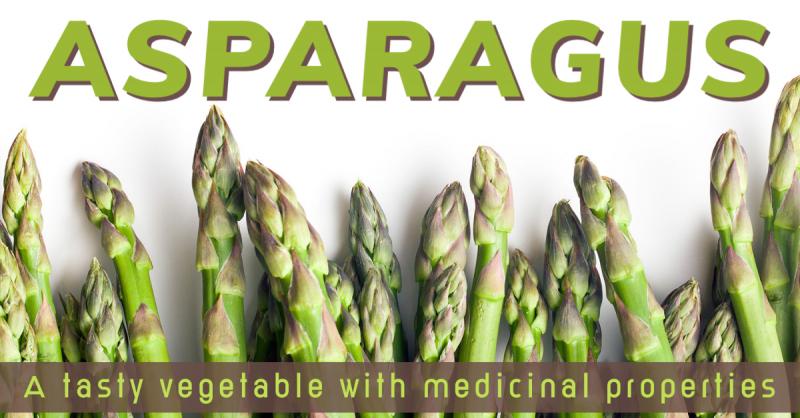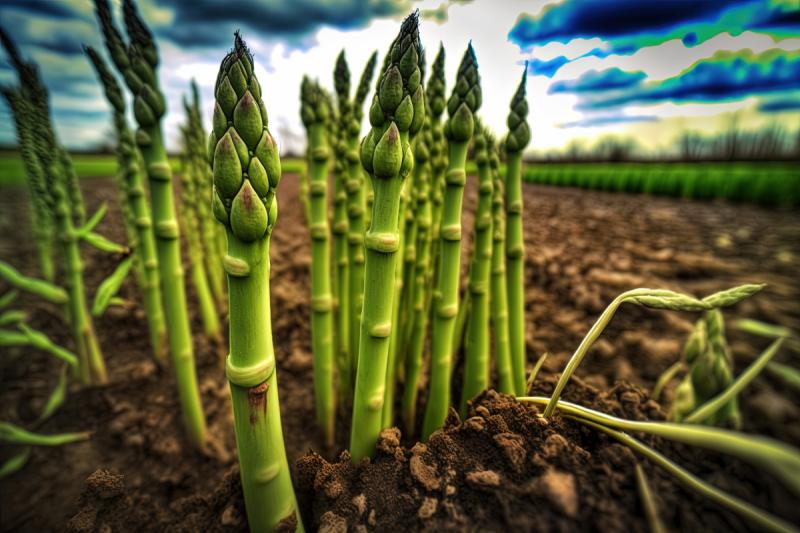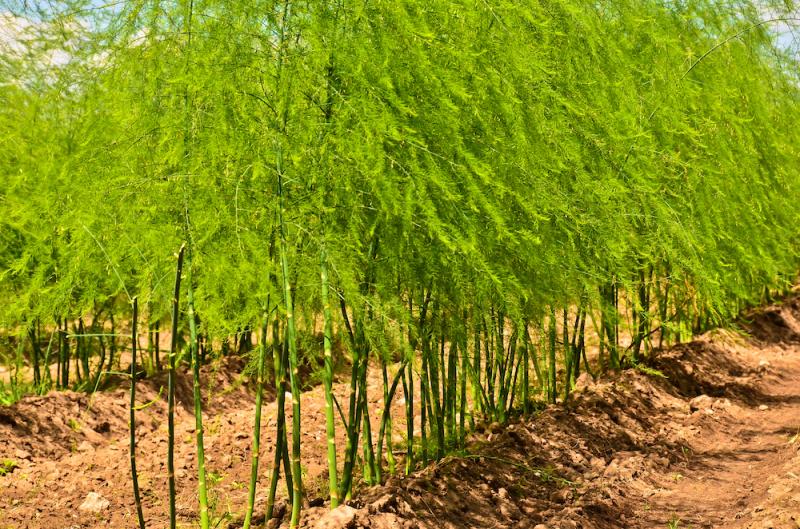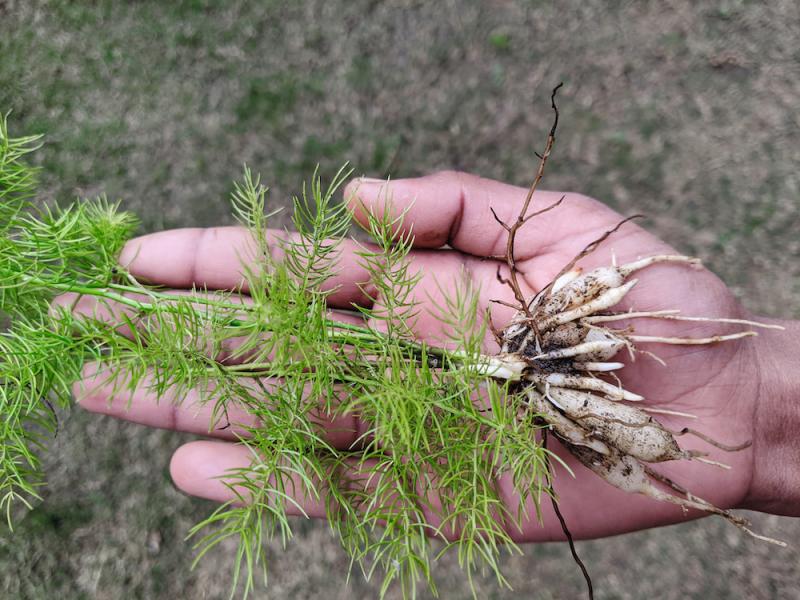
Every spring I welcome the appearance of asparagus in the grocery store. I love this vegetable and think of it as a spring tonic. Asparagus is one of the vegetables that blurs the line between food and medicine because it’s not only tasty and nourishing food. It also has healing properties.
Asparagus and the Urinary System
 Asparagus is a tonic for the kidneys. The vegetable itself helps to strengthen the kidneys and flush acid waste from the system, but it’s the root that is more medicinal. Asparagus root is an effective, nourishing diuretic and a mild laxative. It will increase urine flow to relieve edema. It has been used to reduce inflammation in the urinary tract and is believed to help prevent kidney stones.
Asparagus is a tonic for the kidneys. The vegetable itself helps to strengthen the kidneys and flush acid waste from the system, but it’s the root that is more medicinal. Asparagus root is an effective, nourishing diuretic and a mild laxative. It will increase urine flow to relieve edema. It has been used to reduce inflammation in the urinary tract and is believed to help prevent kidney stones.
Both the root and the vegetable will also give the urine a peculiar smell. This is primarily due to a sulfur compound called methanethiol or methyl mercaptan, but there are probably a handful of other compounds that contribute to the unique odor. If you have natural gas or propane in your home you’re familiar with the odor of methyl mercaptan. It is added to the gasses to give them a strong odor, because both propane and natural gas are odorless, so the methyl mercaptan alerts you to leaks.
Other Health Benefits of Asparagus
 The ability of asparagus to alkalize the system makes it helpful for gout and rheumatism. According to Michael Moore, asparagus contains starches that stimulate the growth of Bifidus bacteria which can help to combat intestinal dysbiosis and tone up leaky gut. Matthew Wood says it can help respiratory congestion accompanied by copious, pale urine and enlargement of the heart in congestive heart failure.
The ability of asparagus to alkalize the system makes it helpful for gout and rheumatism. According to Michael Moore, asparagus contains starches that stimulate the growth of Bifidus bacteria which can help to combat intestinal dysbiosis and tone up leaky gut. Matthew Wood says it can help respiratory congestion accompanied by copious, pale urine and enlargement of the heart in congestive heart failure.
In the 1980s an herbalist whose name I don’t remember told me that he used canned asparagus to help cure cancer. He had people buy the canned asparagus (not the fresh stuff), purree the entire contents of the can (including the liquid), and take one can a day. I’ve never had a chance to try this with anyone, but it’s stuck in my memory all these years. There is little research on asparagus and cancer, including a study that suggested that it increased, rather than decreased cancer growth in mice, but I think that at the very least, asparagus, like many other vegetables would reduce your risk of getting cancer.
The asparagus sold at the grocery store is Asparagus officinalis, but there are two other species of asparagus we’ll talk as well. One is Chinese asparagus, A. cochinchinesis, used in traditional Chinese medicine (TCM) and the other is A. racemosus, commonly known as Shatavrai, an herb used in Ayurvedic medicine. Looking at these relatives of asparagus may help us understand more about the potential uses of the Western variety.
Chinese Asparagus
The uses of Chinese asparagus root in TCM have some similarities to traditional uses for Western asparagus root. The remedy is said to affect the kidney and lung meridians. It can clear heat (inflammation) in the lungs and is used for dry coughs. It also nourishes the yin (fluids) of the body, relieving dry conditions, especially those following diseases with fever. It also moistens the intestines to help relieve dry stool. In this sense it seems to act in an opposite manner to Western asparagus which removes moisture from the body.
Chinese asparagus has been shown to have antineoplastic properties and research has shown it can be helpful for women with breast cancer and for malignant lymphoma.
Shatavari
 Although it belongs to the same genus as Western asparagus, shatavari is very different from it. It’s a climbing vine, native to India, whose leaves resemble pine nettles. Again, the root is used, but it’s mostly considered a tonic for the female reproductive organs. In fact, it’s considered a female ginseng in Ayurvedic medicine and the name, shatavari translates as “she who possesses 1000 husbands.”
Although it belongs to the same genus as Western asparagus, shatavari is very different from it. It’s a climbing vine, native to India, whose leaves resemble pine nettles. Again, the root is used, but it’s mostly considered a tonic for the female reproductive organs. In fact, it’s considered a female ginseng in Ayurvedic medicine and the name, shatavari translates as “she who possesses 1000 husbands.”
Shatavari acts as a uterine tonic and female hormone balancer. It can be helpful for amenorrhea, dysmenorrhea, PMS, and menopause. It’s also used to aid fertility, prepare for pregnancy, and as a postpartum tonic and galactagogue for breastfeeding. It may also be helpful for vaginal dryness.
It still acts on the kidney, however, and is thought to strengthen kidney function. It also modulates the immune system, helping to fight both bacterial and fungal infections. It’s also considered to have anticancer and hepatoprotective effects. Another use is as a remedy for the gastrointestinal tract, specifically acid indigestion, ulcers, and gastritis.
Harvesting Asparagus
If you want to use shatavari or Chinese asparagus root, you’ll have to purchase them, but Western asparagus is something you can grow or even harvest from the wilds. If you learn to recognize the lacy tops of asparagus after it spreads out to produce leaves and flowers, you’ll often spot it growing along ditch banks or other moist places. If you note where you see it, you can come back the following spring and hunt for the young shoots.
You can also dig up the roots and make a tincture for the kidneys. According to Michael Moore, you should make a 1:2 extract with 50% alcohol. You can also chop up the fresh roots and make a decoction to drink for kidney problems. And, of course, you can also just harvest the shoots from your local grocery store and get the health benefits of asparagus.
Steven's Articles
-

-
Barberry and Healthy Personal Boundaries
A thorny shrub for fighting infections and supporting…
December
-

-
The Evidence for Berberine
A yellow alkaloid found in traditional infection-fighting…
-

-
The Sensible Use of Caffeinated Herbs
Kola nuts, guarana, and yerba mate and other herbs…
-

-
The Health Benefits and Problems with Coffee
This popular caffeinated beverage can be beneficial…
October
-

-
Understanding Caffeine & Cellular Adaptation
Preserving the power of caffeine's buzz and the…
September
-

-
Horseradish
A pungent spice for aiding protein metabolism…
-

-
Banaba or Crepe Myrtle
A beautiful tree from Southeast Asia whose leaves…
August
-

-
Monkeyflowers
Flower essences to help see ourselves more clearly…
-

-
Mariposa Lilies
Strengthening the bond between mother and child…
-

-
The Noble Bay Leaf
A common kitchen herb for aiding digestion and…
-

-
Epimedium: Horny Goat Weed
A circulatory stimulant and kidney yang tonic…
July
-

-
The Medicinal and Nutritional Benefits of Apricots
A nutritious fruit and valuable medicinal seed for coughs
-

-
Dogwoods
Asian dogwood is used to stop excessive discharge,…
June
-

-
Neem: The Village Pharmacy
A popular Ayurvedic remedy for dental and immune…
-

-
Spilanthes: The Toothache Plant
A traditional remedy for teeth and gums, as well…

